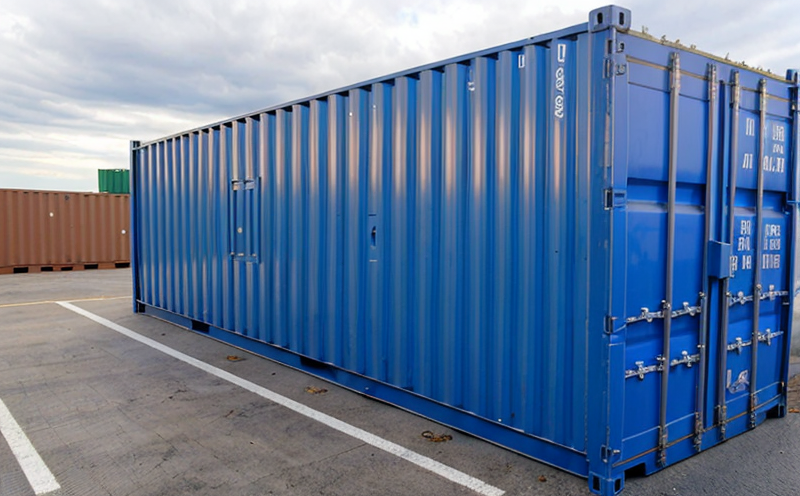BS 903 Creep Testing of Plastic Storage Plastics
The BS 903 standard, specifically the part dealing with creep testing, is a widely recognized and internationally accepted method for assessing the long-term mechanical behavior of plastic materials. This test evaluates how materials deform under constant load over extended periods, which is crucial for ensuring the durability and reliability of storage containers made from plastics.
The BS 903 standard is part of the British Standard series that provides comprehensive guidance on various aspects of material testing. For creep testing specifically, it outlines precise protocols to ensure consistency in test results across different laboratories. This standardized approach is vital for industries where plastic storage containers are used, such as chemical manufacturing, pharmaceuticals, and food processing.
The process involves subjecting the specimen to a specified load at a constant temperature until visible deformation occurs or predetermined time intervals are reached. The creep behavior is then analyzed based on displacement measurements over time. This data helps in understanding the material's performance under static loading conditions, which is critical for predicting the service life of storage containers.
Proper specimen preparation is essential for accurate testing results. Specimens should be cut to specific dimensions and cured according to industry standards before testing. The choice of test temperature and duration can significantly influence the outcome, highlighting the importance of adhering strictly to the prescribed parameters in BS 903.
The instrumentation used for creep testing includes high-precision universal testing machines capable of applying controlled loads over extended periods. These machines are equipped with strain measurement capabilities that provide real-time data on specimen deformation. Software integrated into these systems automates data collection and analysis, ensuring reliable results.
| Test Parameter | Description | Unit of Measurement |
|---|---|---|
| Loading Type | Static load applied continuously until deformation occurs | Newtons (N) |
| Temperature Control | Test conducted at specified temperature to simulate real-world conditions | Celsius (°C) |
| Specimen Geometry | Square cross-section, 50mm x 50mm with a thickness of 3mm | Millimeters (mm) |
| Load Application Time | Continuous loading over a period of up to 1000 hours | Hours (h) |
The BS 903 standard also provides guidelines for interpreting the test results, including acceptable levels of creep deformation. Compliance with these standards ensures that storage containers meet stringent quality and safety requirements.
In conclusion, BS 903 creep testing is a critical tool in ensuring the durability and reliability of plastic storage containers. By adhering to this standard, manufacturers can guarantee that their products will perform reliably under expected loading conditions over extended periods.
Customer Impact and Satisfaction
- Enhanced Product Quality: Customers benefit from consistently high-quality products due to rigorous testing.
- Informed Decision-Making: Accurate test results enable customers to make informed purchasing decisions based on reliable data.
- Increased Trust: Compliance with international standards builds trust among clients and stakeholders.
- Regulatory Compliance: Ensures that products meet legal and regulatory requirements, reducing the risk of non-compliance issues.
The implementation of BS 903 creep testing significantly enhances customer satisfaction by providing transparency and reliability in product performance. This, in turn, fosters stronger relationships between suppliers and customers.
Environmental and Sustainability Contributions
The BS 903 creep testing method plays a crucial role in promoting sustainability by ensuring that plastic storage containers are designed to last longer, reducing the need for frequent replacements. Longer-lasting products mean less waste, which is beneficial for environmental conservation efforts.
In addition, the use of this standard helps reduce material costs associated with over-engineering or premature product failures. By optimizing design and material selection based on test results, manufacturers can achieve cost savings without compromising quality.
Use Cases and Application Examples
| Industry Sector | Example Product | Purpose of Testing |
|---|---|---|
| Chemical Manufacturing | Storage tanks for hazardous chemicals | Evaluating material integrity under constant pressure and temperature conditions |
| Pharmaceuticals | Bulk storage containers for active pharmaceutical ingredients (APIs) | Determining the stability of materials in storage over extended periods |
| Food Processing | Storage bins for bulk food products | Ensuring material resistance to moisture and temperature variations |
| Petrochemicals | Drums for storing volatile petrochemicals | Evaluating the compatibility of materials with harsh chemical environments |
These examples illustrate how BS 903 creep testing is integral to ensuring product reliability across various industries where storage containers are used. By adhering to this standard, manufacturers can ensure that their products meet stringent quality and safety requirements.





